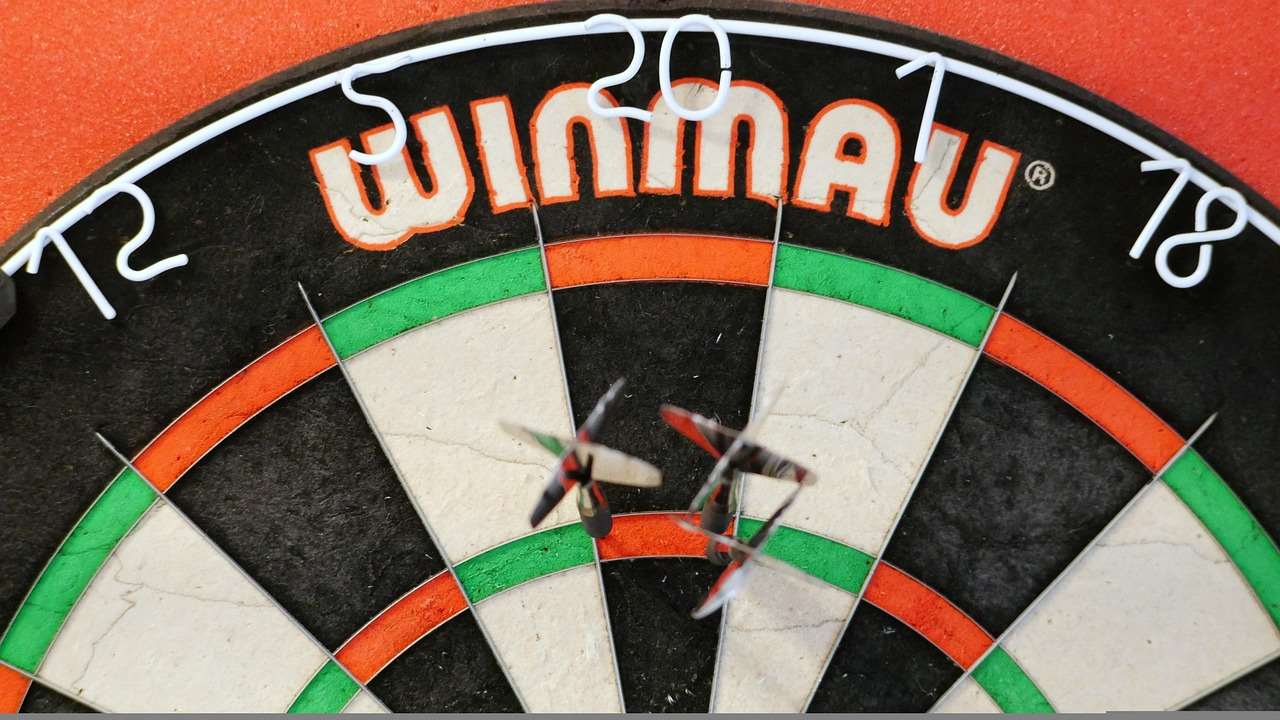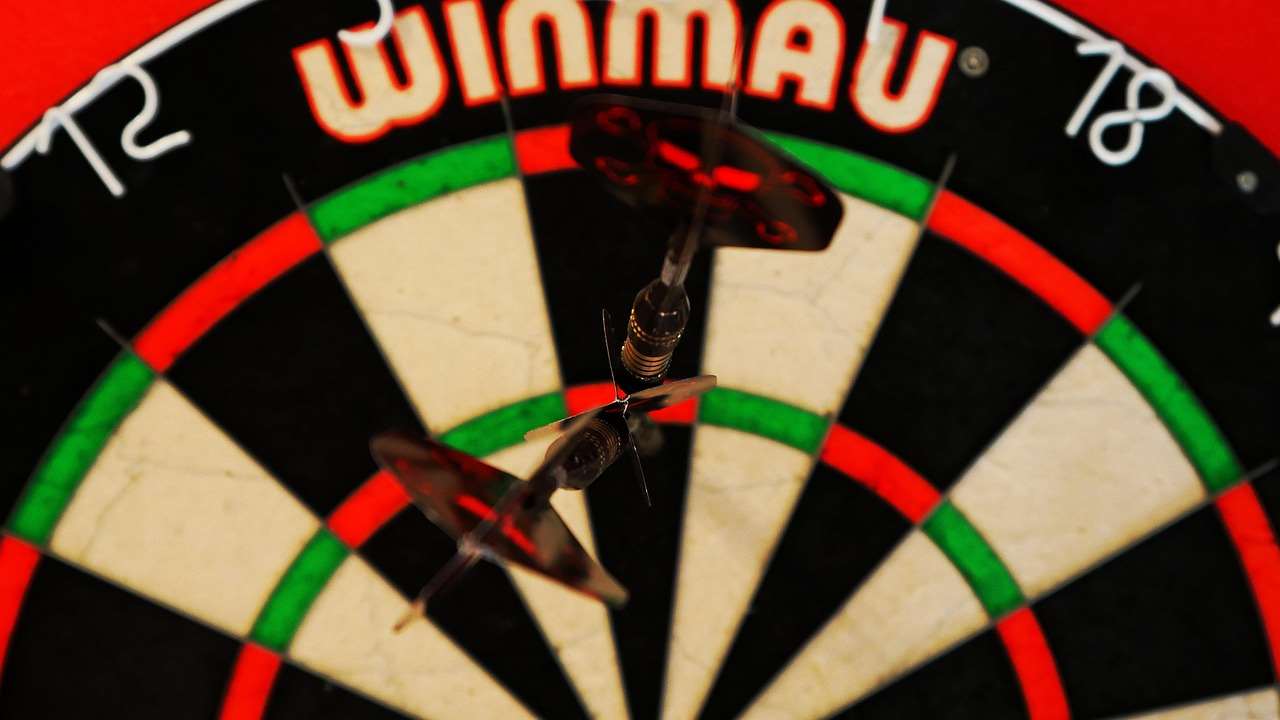Understanding darts scoring averages is crucial for improving your game. This article will explain how to calculate and interpret these averages, along with strategies to improve your scores. We’ll also cover related concepts to help you become a more skilled darts player.
⚠️ Still Using Pen & Paper (or a Chalkboard)?! ⚠️
Step into the future! The Dart Counter App handles all the scoring, suggests checkouts, and tracks your stats automatically. It's easier than you think!
Try the Smart Dart Counter App FREE!Ready for an upgrade? Click above!
Calculating your darts scoring averages is a straightforward process, but understanding what the numbers mean and how to use them to improve your game is key. Let’s delve into the specifics.
Understanding Darts Scoring Averages
Your darts scoring average is a measure of your consistency and skill. It represents the average number of points you score per three darts thrown. To calculate your average, simply divide your total score by the number of three-dart turns you played. For example, if you scored 300 points over 10 three-dart turns, your average would be 30 points per turn (300/10 = 30).
However, simply knowing your average isn’t enough. You also need to understand the components that contribute to that average. Are you consistently hitting doubles? Are you hitting trebles regularly? Are you struggling with specific sections of the board? Analyzing these aspects, in addition to your overall darts scoring averages, gives you a much clearer picture of your strengths and weaknesses.

Many professional players boast averages well above 100. Achieving this requires significant practice and mastery of the game. Understanding how different scoring areas contribute to your overall average is essential for setting realistic goals and focusing your training. For instance, consistent hitting of the outer ring (double) of the board is incredibly valuable, but also challenging.
Factors Affecting Darts Scoring Averages
Consistency
Consistency is arguably the most important factor in achieving high darts scoring averages. Inconsistent scores will drastically reduce your average, even if you occasionally throw very high scores. Practicing consistent throwing technique is vital for improving your average. This means focusing on the same grip, stance, and throwing motion every time you throw a dart.
Accuracy
Aiming accurately is crucial. The placement of each dart significantly impacts your score. A dart aimed at a triple 20 is worth much more than a dart hitting single 1. Regular practice, focusing on your accuracy and aiming will directly affect your darts scoring averages.
Leg Strength
Many dart players overlook this but maintaining the correct leg posture and strong leg structure enhances the stability of your throw. Strong legs contribute to consistency in delivering the dart.
Dart Selection
The weight and design of your darts directly impact your throw. Choosing darts that feel comfortable and balanced in your hand can significantly impact your accuracy and therefore, your darts scoring averages. Experiment with different weights and styles to find the best fit for your throwing style. If you are struggling to find the right balance, consider exploring options like dart barrel einzeln kaufen to further refine your equipment setup.

Many players also experiment with different dart flights, for instance, Jagermeister dart flights are popular among enthusiasts for their aesthetic appeal and feel, but there are many others too. The right flight can lead to better flight characteristics and hence improve accuracy.
Improving Your Darts Scoring Averages: Practical Tips
- Practice Regularly: Consistent practice is key to improvement. Aim for shorter, focused sessions rather than long, tiring ones.
- Analyze Your Game: Keep track of your scores and identify areas for improvement. What numbers are you consistently missing? What are your strengths?
- Focus on Technique: Mastering the correct throwing technique is fundamental. Watch professional players and consider taking lessons from a qualified coach.
- Use a Dart Counter App: Consider using a Dart Counter App like Dart Counter App to easily track your scores and analyze your progress.
- Warm-up Properly: Always warm-up before playing. This helps prevent injuries and gets your muscles ready for throwing.
- Mental Game: The mental aspect of darts is crucial. Stay focused, positive, and manage stress effectively.
- Work on Your Doubles: Hitting doubles consistently is essential for finishing legs quickly. Dedicate practice time to improving your doubles accuracy. Remember that hitting the double is a key component of successful scoring and greatly influences darts scoring averages.
Many players find it helpful to focus on specific areas, such as working on their treble in darts meaning and perfecting trebles in the early part of a game.
Understanding Different Types of Averages
While the basic darts scoring averages calculation is straightforward, there are other ways to measure performance. These might include:
- Three-Dart Checkout Average: This looks specifically at the average score needed to finish a leg from a specific score. A high three-dart checkout average suggests a strong ability to finish games under pressure.
- Legs per Game Average: This looks at how many legs you are winning on average per game, providing a different perspective than simply the darts scoring averages.
Analyzing different types of averages offers a more holistic understanding of your game and helps pinpoint areas that need more attention.
Furthermore, understanding the nuances of playing conditions can also improve your score. Consider factors such as the darts oche mat length and the overall setup of the dartboard location.
Advanced Strategies for Improving Your Average
Beyond the basics, focusing on specific areas can significantly boost your darts scoring averages. This includes:
- Targeting Specific Numbers: Instead of aiming randomly, focus on hitting specific high-scoring numbers consistently.
- Practicing Checkouts: Regular practice of common and difficult checkouts under pressure improves your finishing abilities and overall average.
- Visualisation Techniques: Mental rehearsal can improve accuracy and reduce errors during games.
Remember, even minor improvements in technique or focus can significantly affect your overall average.
The Importance of Game Analysis
Regular game analysis is a crucial aspect of improving your darts scoring averages. By reviewing your games, you can identify recurring patterns, both positive and negative. This includes analyzing:
- Consistency of throws: Are your throws consistently landing in the desired segment?
- Checkout performance: Are you struggling to finish legs? Identifying specific checkout issues can be a focus area.
- Specific number accuracy: Are there particular segments of the dartboard you are struggling with?
By addressing these areas through focused practice, you can make measurable improvements in your darts scoring averages.

Understanding your game thoroughly is key. Consider factors such as the location of your dartboard, as a poorly positioned darts stand by me might affect your throws. Similarly, if you’re playing in a pub or club, you might even need to consider the darts stand dublin for instance. Location and setup are both overlooked considerations.
Setting Realistic Goals
Setting realistic goals is crucial for maintaining motivation and seeing progress. Instead of aiming for drastic improvements overnight, focus on gradual progress. Start by setting small, achievable goals, such as increasing your average by a few points each week. Celebrate your successes along the way to stay motivated.
Don’t be discouraged by setbacks. Consistency and perseverance are key to long-term improvement in darts. The journey to improving darts scoring averages is a marathon, not a sprint.

Remember, improving your darts scoring averages is a continuous process. By consistently practicing, analyzing your game, and focusing on key areas for improvement, you can steadily increase your scores and elevate your overall darts playing ability. Consider your darts set professional setup and ensure it aids your practice sessions. And don’t forget to have fun along the way – enjoyment is a key component to long-term success in any sport or hobby.
Conclusion
Improving your darts scoring averages requires dedication, practice, and a strategic approach. By understanding the factors that influence your scores, analyzing your game, and setting realistic goals, you can steadily improve your performance. Remember to practice regularly, focus on technique, and utilize resources such as apps and coaching to maximize your potential. With consistent effort and a commitment to improving, you’ll be well on your way to achieving your desired darts scoring averages. Perhaps you might even break the longest darts bullseye record one day! Happy throwing!
Hi, I’m Dieter, and I created Dartcounter (Dartcounterapp.com). My motivation wasn’t being a darts expert – quite the opposite! When I first started playing, I loved the game but found keeping accurate scores and tracking stats difficult and distracting.
I figured I couldn’t be the only one struggling with this. So, I decided to build a solution: an easy-to-use application that everyone, no matter their experience level, could use to manage scoring effortlessly.
My goal for Dartcounter was simple: let the app handle the numbers – the scoring, the averages, the stats, even checkout suggestions – so players could focus purely on their throw and enjoying the game. It began as a way to solve my own beginner’s problem, and I’m thrilled it has grown into a helpful tool for the wider darts community.